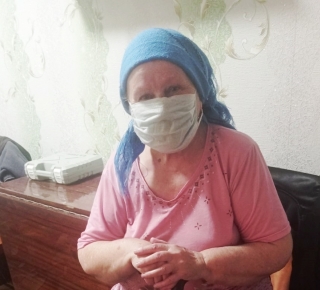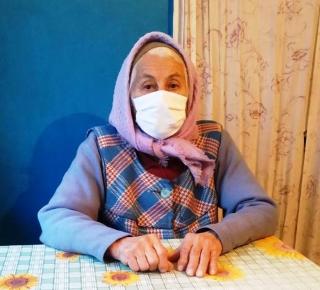More than two million older people in the east of Ukraine are at extreme risk as a result of the Russian assault on the country, which will devastate the lives of millions of people.
Older people are often unable to flee from conflict and are left alone without family or their wider community. They are isolated, without loved ones and cut off from support, including access to medicine and food. They are particularly exposed when violence breaks out, as they may not be able to shelter from danger.

“I live on the line of contact, where they shoot almost every day. The shelling is what worries me the most. What if they hit the house, and blast the windows, roof, doors out? Who will help me?
“If the war starts and they shoot hard, I will go down to the basement. There are safe places in the village, but first you need to get there, and it may not be safe.”
The words of Ekaterina, a seventy-year-old woman living in eastern Ukraine.
Justin Derbyshire, Chief Executive at HelpAge International called on the international community to find an urgent diplomatic solution to the crisis to avoid a humanitarian catastrophe in a country where people have still not recovered from the 2014 conflict.
“We know from first-hand experience the devastation caused to communities and the lives of older people by the conflict in 2014. This cannot be repeated and an urgent peaceful resolution must be found if a humanitarian catastrophe is to be averted,” said Justin Derbyshire.
“In 2014 and 2015 we witnessed the horrific devastation wreaked by the conflict which destroyed thriving communities, dividing families and shattering people’s physical and mental health. Many, particularly the older population, have not yet recovered. We cannot sit back and allow history to repeat itself. A massive humanitarian crisis can only be avoided if all parties respect international humanitarian law and put the safety of civilians first.”
Lydia, an eighty-six-year old woman in Ukraine expressed her fear for the current situation.

“I’m afraid that it will be like in the war [World War 2]. I was five years old when the war started and remember how military vehicles were driving down the street. There was nothing to eat. We had to eat grass.
“If the war breaks out, I’ll stay at home. There is a cellar in my yard, but I won’t be able to reach it. I hope my neighbours don’t leave me, God bless them. People suffer, they live in fear, everyone is worried and afraid.”
Research carried out by HelpAge in Ukraine after the 2014 conflict, highlights the particular risks older people will face if conflict escalates, including:
- Difficulties escaping or avoiding fighting, which will result in them being separated them from their families and lead to social exclusion and isolation. The vast majority (96%) of older people surveyed experienced conflict-related mental health issues.
- Risk of severe income shortages as nearly every older person affected (99%) relied on a pension as their main source of income, which can be disrputed if they cannot cannot access payment points.
- A lack of access to and difficulty affording healthcare. 97% of people surveyed had at least one chronic disease, and not being able to access healthcare represents a major issue.
- Poor living conditions and a lack of support for those with disabilities. Over half (53%) of older people reported needing assistive devices, including walking frames, canes and toilet chairs.
HelpAge runs a programme for almost 5,000 older people in eastern Ukraine. 4,000 get support from a network of volunteers, and 800 through community safe spaces. In the run-up to the conflict aid packages were distributed and plans have been put in place to provide continued support for those in need.
General activities include the provision of community safe spaces for older people, targeted advocacy and coordination with NGOs, UN agencies and relevant authorities to ensure the inclusion of older people in the delivery of services, and psychosocial support. Peer-to-peer support groups and home-based care activities are provided while assistive devices, and hygiene kits are distributed to those in need.
HelpAge ceased all active programme work in mid-February when shelling began in eastern Ukraine but has developed a plan for continued outreach to those at risk and remains in active contact with those it supports through its staff and network of volunteers.
